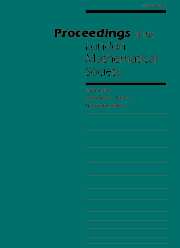Article contents
The Ziegler spectrum of a locally coherent Grothendieck category
Published online by Cambridge University Press: 01 May 1997
Abstract
The general theory of locally coherent Grothendieck categories is presented. To each locally coherent Grothendieck category $\C$ a topological space, the Ziegler spectrum of $\C,$ is associated. It is proved that the open subsets of the Ziegler spectrum of $\C$ are in bijective correspondence with the Serre subcategories of $\coh \C,$ the subcategory of coherent objects of $\C.$ This is a Nullstellensatz for locally coherent Grothendieck categories. If $R$ is a ring, there is a canonical locally coherent Grothendieck category $\RC$ (respectively, $\CR$) used for the study of left (respectively, right) $R$-modules. This category contains the category of $R$-modules and its Ziegler spectrum is quasi-compact, a property used to construct large (not finitely generated) indecomposable modules over an artin algebra. Two kinds of examples of locally coherent Grothendieck categories are given: the abstract category theoretic examples arising from torsion and localization and the examples that arise from particular modules over the ring $R.$ The duality between $\coh (\RC)$ and $\coh \CR$ is shown to give an isomorphism between the topologies of the left and right Ziegler spectra of a ring $R.$ The Nullstellensatz is used to give a proof of the result of Crawley-Boevey that every character $\xi: K_0 (\coh \C) \to Z$ is uniquely expressible as a $Z$-linear combination of irreducible characters.
1991 Mathematics Subject Classification: 16D90, 18E15.
- Type
- Research Article
- Information
- Copyright
- © London Mathematical Society 1997
- 69
- Cited by


